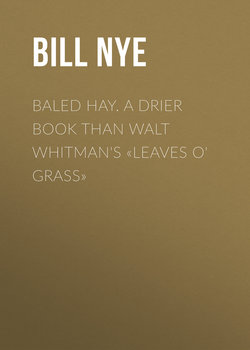Читать книгу Baled Hay. A Drier Book than Walt Whitman's «Leaves o' Grass» - Nye Bill - Страница 10
CHIPETA'S ADDRESS TO THE UTES
ОглавлениеPEOPLE of my tribe! the sorrowing widow of the dead Ouray speaks to you. She comes to you, not as the squaw of the dead chieftain, to rouse you to war and victory, but to weep with you over the loss of her people and the greed of the pale face.
The fair Colorado, over whose Rocky mountains we have roamed and hunted in the olden time, is now overrun by the silver-plated Senator and the soft-eyed dude.
We are driven to a small corner of the earth to die, while the oppressor digs gopher holes in the green grass and sells them to the speculator of the great cities toward the rising sun.
Through the long, cold winter my people have passed, in want and cold, while the conqueror of the peaceful Ute has worn $250 night-shirts and filled his pale skin with pie.
Chipeta addresses you as the weeping squaw of a great man whose bones will one day nourish the cucumber vine. Ouray now sleeps beneath the brown grass of the canyon, where the soft spring winds may stir the dead leaves, and the young coyote may come and monkey o'er his grave. Ouray was ignorant in the ways of the pale face. He could not go to Congress, for he was not a citizen of the United States. He had not taken out his second papers. He was a simple child of the forest, but he stuck to Chipeta. He loved Chipeta like a hired man. That is why the widowed squaw weeps over him.
A few more years and I shall join Ouray – my chief, Ouray the big Injun from away up the gulch. His heart is still open to me. Chipeta could trust him, even among tire smiling maidens of her tribe. Ouray was true. There was no funny business in his nature. He loved not the garb of the pale face, but won my heart while he wore a saddle-blanket and a look of woe.
Chipeta looks to the north and the south, and all about are the graves of her people. The refinement of the oppressor has come, with its divorce and schools and gin cocktails and flour bread and fall elections, and we linger here like a boil on the neck of a fat man.
Even while I talk to you, the damp winds of April are sighing through my vertebras, and I've got more pains in my back than a conservatory.
Weep with the widowed Chipeta. Bow your heads and howl, for our harps are hung on the willows and our wild goose is cooked.
Who will be left to mourn at Chipeta's grave? None but the starving pappooses of my nation. We stand in the gray mist of spring like dead burdocks in the field of the honest farmer, and the chilly winds of departing winter make us hump and gather like a burnt boot.
All we can do is to wail. We are the red-skinned wailers from Wailtown.
Colorado is no more the home of the Ute. It is the dwelling place of the bonanza Senator, who doesn't know the difference between the plan of salvation and the previous question.
Chipeta cannot vote. Chipeta cannot pay taxes to a great nation, but you will be apt to hear her gentle voice, and her mellow racket will fill the air till her tongue is cold, and they tuck the buffalo robe about her and plant her by the side of her dead chieftain, where the south wind and the sage hen are singing.
